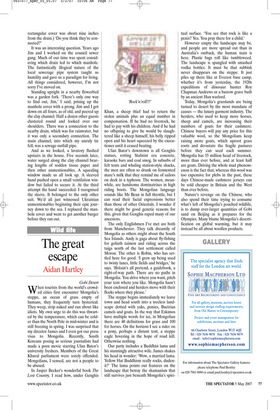The great escape
Aidan Hartley
Gobi Desert
When tourists from the world’s crowded cities first encounter Mongolia’s steppe, an ocean of grass empty of humans, they frequently turn hysterical. They weep, strip naked and run about like idiots. My own urge to do this was thwarted by the temperature, which can be colder than the North Pole in mid-winter and is still freezing in spring. I was surprised that my director James and I even got our press visas to Mongolia. Recently, South Koreans posing as serious journalists had made a porn movie starring Ulan Bator’s university freshers. Members of the Great Khural parliament were sorely offended. Mongolians, I sensed, are not a people to be abused.
In Jasper Becker’s wonderful book The Lost Country, I read how, under Genghis Khan, a sheep thief had to return the stolen animals plus an equal number in compensation. If he had no livestock, he had to pay with his children. And if he had no offspring to give he would be slaughtered like a sheep himself, his belly ripped open and his heart squeezed by the executioner until it ceased beating.
Ulan Bator’s downtown is all Genghis statues, rotting Stalinist era concrete, karaoke bars and coal smog. In suburbs of felt tents and whaling station-style shacks, the men are often so drunk on fermented mare’s milk that they remind me of sailors on deck in a typhoon. The women, meanwhile, are handsome dominatrixes in high riding boots. The Mongolian language sounds like Mr Bean in full throttle, but I can read their facial expressions better than those of other Orientals. I wonder if there might be good genetic reasons for this, given that Genghis raped many of our ancestors.
The only Englishmen I’ve met are both from Manchester. They talk dreamily of Mongolia as others might about the South Sea Islands. Andy is gaga about fly-fishing for goliath taimon and riding across the taiga north of the last settlement called Moron. The other is Robin, who has settled here for good. ‘I grew up being used to twisty lanes, little fields and bridges,’ he says. ‘Britain’s all pretend, a guidebook, a right-of-way path. There are no paths in Mongolia. You drive where you want, pitch your tent where you like. Mongolia hasn’t been enclosed and herders move with their flocks where they please.’ The steppe begins immediately we leave town and head south into a treeless landscape dotted with yaks, ponies, Bactrian camels and goats. In the way that Eskimos have multiple words for ice, in Mongolian there are 40 definitions for grass and 100 for horses. On the horizon I see a rider on a pony, perhaps a distant tent, a steppe eagle hovering in the hope of road kill. Otherwise nothing.
Our party includes a Buddhist lama and his stunningly attractive wife. James shakes his head in wonder: ‘Wow, a married lama. Yellow Hat Buddhism really rocks, dudenit?’ The lama points out features on the landscape that betray the shamanism that still survives just beneath Mongolia’s spiri tual surface. ‘You see that rock is like a penis? Yes. You pray there for a child.’ However empty the landscape may be, and people are more spread out than in Australia’s outback, the human stain is here. Plastic bags roll like tumbleweed. The landscape is spangled with smashed vodka bottles. It must be that rubbish never disappears on the steppe. It just piles up there like at Everest base camp, whether it’s from yesterday, the 1920s expeditions of dinosaur hunter Roy Chapman Andrews or a barrow grave built by an ancient Hun warlord.
Today, Mongolia’s grasslands are being turned to desert by the most mundane of causes — the luxury garment industry. The herders, who used to keep more horses, sheep and camels, are increasing their numbers of goats for their cashmere. Chinese buyers will pay any price for this valuable wool, so the Mongolians keep raising more goats, which uproot grass roots and devastate the fragile pastures before they can seed each summer. Mongolia has 35 million head of livestock, more than ever before, and at least half are goats. Driving the whole mad phenomenon is the fact that, whereas this wool was too expensive for plebs in the past, these days Chinese-made cashmere jerseys can be sold cheaper in Britain and the West than ever before.
Nature’s revenge on the Chinese, who also spend their time trying to consume what’s left of Mongolia’s poached wildlife, is to dump ever-larger quantities of Gobi sand on Beijing as it prepares for the Olympics. Many blame Mongolia’s desertification on global warming, but it may instead be all about woollen products.


































































































 Previous page
Previous page